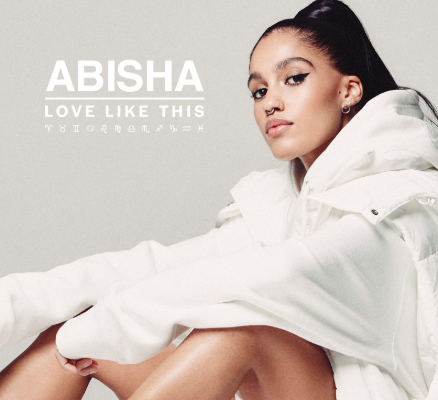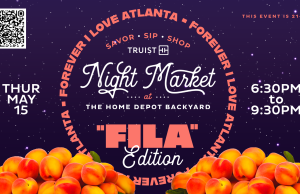Abisha “Love Like This”

“‘Love Like This’ is about an unexpected love – someone that you meet and you don’t expect to have feelings for – but they take you by surprise and you just have that connection with them. I wanted to make sure I also touched on discrimination, particularly homophobia – ‘everybody thinks they know better, they don’t wanna see us together’ – and having to deal with that by not caring what anyone else thinks and just being true to yourself regardless, being proud and standing up to the haters.”
Officially wrapping up just two years on the scene, ABISHA has made massive strides worldwide releasing single after single. Her debut, “All That“ launched in 2017 via tastemaker brand Highsnobiety which touts a monthly readership of over 4 million while her follows ups [“Project X,” “Nothing Matters,” “Confused” “Real Life“] were well-received and led her to coverage from the likes of Clash, Colors, Complex, Covers, Dazed, Euphoria, Gay Times, i-D, NYLON, Red Bull, and The Line Of Best Fit to name a few. ABISHA’s signature electronic-pop tinged R&B sound landed her on several DSP playlists including Amazon’s Proud, Apple’s Best of the Week, Spotify’s New Music Friday UK, This Is How We Do, Spotify & Chill, and Soultronic, and TIDAL’s .wav and Rising: Pop plus editorial playlists such as Gay Times’ Queer & Now, i-D’s Best New Music, and The Independent’s Now Hear This. Marrying up her enthusiasm for art, fashion, and music, ABISHA has also worked with top brands from ASOS to Barbour International, PUMA, and Superdry.
Although ABISHA initially struggled with uncovering her artistic voice, she experienced a major breakthrough after several months of collaborating with Mike Chapman [an iconic songwriter/producer known for his work with FKA twigs and on such history-making albums as Blondie‘s Parallel Lines] and Simon Pilton, writing on her own and sketching a batch of songs that included her mesmerizing debut single “All That.” As she maintained the momentum with singles like the elegantly experimental “Project X,” the brightly textured pop anthem “Nothing Matters,” and the passionately-charged “Confused,” ABISHA continued to refine and expand her artistry, eventually linking up with Three Bears Entertainment, co-writer Dantae Johnson and producer Pete Boxsta Martin to work on new content.
In each song she shares with the world, ABISHA embodies a quiet self-possession, an element especially evident in her sophisticated yet soulful vocal presence. But for the 25-year-old singer/songwriter, that confidence follows from overcoming profound insecurity, a journey closely tied to coming of age as a gay person of color in her homeland of Devon. Imbued with both raw sensitivity and understated power, ABISHA’s music intimately documents her transformation through the years – and ultimately speaks to the urgency of representation, and the radical beauty of self-acceptance. “Growing up black and gay in a place that’s largely white and where I didn’t know of anyone else who was queer, I had this feeling of being different for most of my life,” ABISHA reveals. “There wasn’t anyone around for me to identify with, and there weren’t even many popular queer artists back then – so for a long time I wanted so badly to be what I thought was normal. Now that I’m discovering who I am as an artist, I’m also discovering who I am as a person, and I’ve finally gotten to a place where I’m happy to stand out and express myself every way I can.”
As the only mixed-race student in her school (her mother’s English and from Devon, her father’s of Jamaican descent), she also studied dance for much of her childhood, but felt a deep unease at dance school. “In dance class you’re in front of a mirror the whole time, and I was always so aware that I didn’t look like the other girls,” she says. “They were all mostly petite and blonde and blue-eyed, and I was this chubby mixed-race kid with big, curly hair, and I used to cry because I desperately wanted hair like theirs. I was never bullied or anything for being different, but I had this very strong feeling that I didn’t fit in.”
Once she’d settled in London, ABISHA began to find the sense of belonging that had eluded her back home. “For the first time in my life, I was surrounded by people who looked like me, and it felt amazing to not be the odd one out anymore,” she says. Finally finding comfort in her own skin after exploring the world beyond Devon, she’s opening up about the racism she’s faced, insecurities she’s dealt with due to her race and her sexuality while also flagging that there’s a lot left to improve on and grow from.
All throughout her forthcoming body of work, ABISHA’s lyrics unfold with a directness that also reflects that greater self-assurance, as well as a heightened clarity about her mission as an artist. “Over the past year or so I’ve thought a lot more about what I want to convey with my music, and so much of that is about empowering people through sharing my experiences,” she says. To that end, she’s begun exploring ways to use her music, visuals, and singular fashion sense to fully embrace what sets her apart. “I think it’s so important for artists to be open, because it helps other people to feel comfortable with themselves – especially people who come from a place like I did, where they don’t have anyone they can relate to or talk to,” she says. “I’d love for my music to get through to people and help them understand that how they feel is completely okay, and they don’t ever have to hide who they truly are.”














